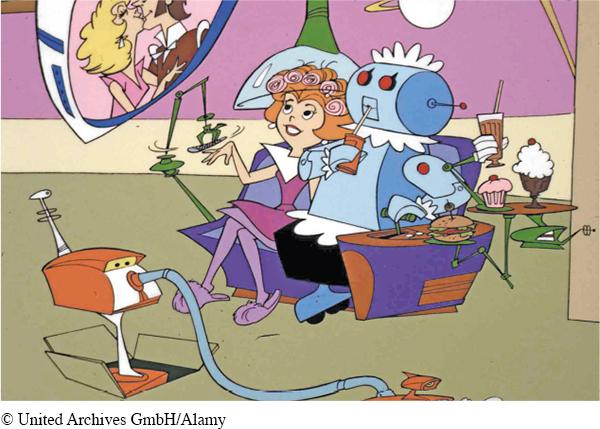10.12 CONVERSATION
OUR ROBOTIC FUTURE
Given the rapid advances in technology in the last thirty years, it’s safe to say that automation and robots are going to be more and more a part of our lives in the future. The question is, in what way?
Will the future be more like the Terminator, the series of films starring Arnold Schwarzenegger, about killer robots intent on enslaving humanity, or like the Jetsons, the 1960s animated comedy about a future in which robots cater to the family’s every need and the father only works one hour a day for two days a week?
Our society is already seeing signs of both possibilities: robots and drones are being used on battlefields, while elsewhere robots are being used as rescue workers, caregivers, and even as pets. Robots seem to be just as good or evil as their human creators choose, which is perhaps what worries us.
Netscape founder and Silicon Valley legend Marc Andreessen believes the future will be more Jetsons than Terminator. In a 2014 blog post, he predicts a golden age of robotics in the future:
Housing, energy, health care, food, and transportation — they’re all delivered to everyone for free by machines. Zero jobs in those fields remain. [. . .] [I]t’s a consumer utopia. Everyone enjoys a standard of living that kings and popes could have only dreamed of.
Since our basic needs are taken care of, all human time, labor, energy, ambition, and goals reorient to the intangibles: the big questions, the deep needs. Human nature expresses itself fully, for the first time in history. Without physical need constraints, we will be whoever we want to be.


What are the attitudes toward technology represented in this cel from the Jetsons, a cartoon that first ran in the early 1960s and then again in the early 1980s?
The preeminent theoretical physicist Stephen Hawking—
The primitive forms of artificial intelligence we already have, have proved very useful. But I think the development of full artificial intelligence could spell the end of the human race. [. . .] It would take off on its own, and re-
Do you agree, or do you think Hawking’s prediction is a bit too pessimistic? On the other hand, what downside to a robotic future is Andreessen ignoring?
Yet another possibility may be that the future will be like the one depicted in Robocop, a film about a police officer who is nearly killed in the line of duty, but who is saved by being augmented with robotics, and who becomes a more effective police officer because of his implanted technology. Perhaps humanity will increasingly rely on machines until we merge with them by bits and pieces. Already the newest hearing aids are Bluetooth enabled, letting wearers stream music and answer cell phones; robotic exoskeletons allow the paralyzed to walk; and robotic prosthetics can allow amputees to play the piano. Russ Tedrake, a professor of electrical engineering and computer science at MIT, says:
The line between robots and people will be blurred with smart prosthetics and implanted components. It won’t be robots and people but robot people. [. . .] If you were in distress and given the choice for a longer, more comfortable life by simply replacing your spleen with a machine that could do the same job, wouldn’t you take it?
So, the question remains: not if robots will play a role in our future, but what kind of role they will play. It is natural for humans to be uneasy about how robotics—
TEXTS
Isaac Asimov / Robot Dreams (fiction)
Margaret Atwood / Are Humans Necessary? (nonfiction)
Kevin Kelly / from Better Than Human: Why Robots Will—
Richard Fisher / Is It OK to Torture or Murder a Robot? (nonfiction)
Arthur House / The Real Cyborgs (nonfiction)
Francis Fukuyama / Transhumanism (nonfiction)
James Barrat / from Our Final Invention: Artificial Intelligence and the End of the Human Era (nonfiction)
Rosa Brooks / In Defense of Killer Robots (nonfiction)